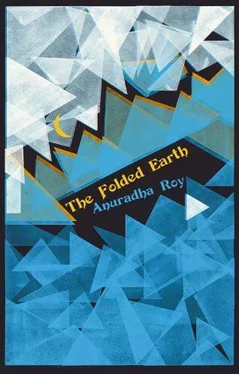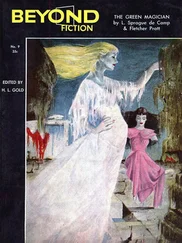Kundan opened his mouth to answer. But then noticed something. He hurriedly put his tray down on the table and ran towards the far end of the garden.
Three cows and two buffaloes were browsing at the edge of the lawn, quite close to the Brigadier. The bells around their necks tinkled as they reached for leaves just above their heads. I recognised Gouri, who let out a bellow as Kundan Singh reached her, slapped her rump, and shouted. Gouri gave a dismissive shake of her head, seeming to know at once a man who had no notion of herding cows. Kundan Singh looked around for the gardener and the chowkidar who knew how these things were done, but they were nowhere to be seen. The second bearer came to help move the cattle away from the people and the food, but now there were two amateurs, shouting to little purpose. One of the cows ambled down the slope, while a buffalo lumbered towards a laden table, scattering the captains and majors sitting at it. A few goats paused enquiringly at the edge of the slope and then skipped onto the lawn, eager to join the party. I spotted the delicate, long-legged little kid that Charu had named Pinki and necklaced with a red rope and bell.
“Quite a dairy industry here, Chauhan,” the Brigadier said with a dry laugh. “So what if Ranikhet lacks other industries.”
Mr Chauhan looked around with agitated swivels of his head for the cowherd responsible. I could see the culprit at a distance: it was Charu’s uncle, Sanki Puran, half asleep in a sliver of sunlight on a warm boulder far down the slope that led away from the house, smoking a beedi which was very likely spiked with dope. The forest around Puran was stabbed here and there by the first scarlet explosions of rhododendron and there was a white cloud of plum blossoms not far from him. Those patches of colour apart, his clothes merged so perfectly with the green and brown of the foliage that nobody else had noticed him. Puran wore the same khaki and olive army camouflage uniform all year, never taking it off save to bathe a few times when the summer grew too hot. Summer or winter, he also wore an army-issue leather-patched olive pullover, his elbows glistening through its holes. He had trousers that ended five inches above his ankles and a woollen cap that covered half of one eye.
By now, much of the party had converged in the centre of the lawn, looking as if they had never seen cattle before. The goats scampered about making for the discarded plates on the grass, chewing pakoras and paper napkins with gusto. Pinki executed perfect twirls and leaps near the birdhouse, to the delight of the children who had been watching T.V. inside all this time. Kundan scoured the valley for Charu, and when at length he sighted Puran, he clambered down the hillside towards him in relief, shouting, “Arre O Puran-da!”
Puran came to life at last. Something was the matter — he grasped that — and he clambered up towards us yelling his herding calls. Alarmed and confused by clashing shouts from Kundan and Puran, the cows and buffaloes began to blunder off in different directions. Then I saw a flash of purple streaking uphill at great speed from far away: Charu.
The Brigadier side-stepped a buffalo and said to his flustered host, “Difficult proposition having a lawn, eh? You need more staff — and fencing, you need fencing. What’s the point of signboards saying trespassers will be prosecuted? Can you prosecute a cow?” He gave everyone a wide smile and Mr Chauhan said, “Well put, Sir, well put.”
Ramesh said, “No, no, Brigadier! Cows are — holiness apart — natural lawn mowers. Best way to use resources, I say! Two for the price of one — they get food, you get a neat lawn.”
Puran’s exhortations were more effective than Kundan’s, and the cows began to head for the valley where Charu now stood. Puran clicked his tongue against his teeth, urging them on. The Brigadier, the hotel manager, and Mr Chauhan stood aside, pretending they were not flat against the garage, trapped between thorny rose bushes on one side and the garage door on the other. Diwan Sahib observed them with a savage smile and muttered “Perfect” under his breath, while the women cheered to encourage the cows. The smell from unbathed Puran made the Brigadier put a napkin to his nose, and two or three others followed suit.
“Why is this cowherd in fatigues?” the Brigadier asked Mr Chauhan over the sounds of laughter and mooing. “Where did he get them? Are the army stores secure? Must look into it.” He had turned away from the cattle towards Mr Chauhan as he spoke, and did not notice a young cow aiming a kick at him as she passed. The Brigadier yelped and sprang away, and then, ashamed, said into the middle distance, “Pahari cows! It’s only hill cows that kick like this. Nervous beasts.” He glanced around to see if anyone was laughing at him, but everyone, all at once, had gone quiet. The hotelier stared at the cattle with a fixed gaze of horror, shredding a paper napkin into tiny pieces. Bits of white tissue paper settled on the lawn around him.
Mr Chauhan lost his composure. “Enough!” he shouted towards Puran. “Enough is enough! I’m going to lock you up! With your damned cows and goats!” He noticed people staring and lowered his voice. “Every single day since I’ve been posted here,” he said to the Brigadier, “I’ve seen this madman sitting on Mall Road in that dirty uniform, feeding stray dogs, and I’ve said, Is this the way? Can this be allowed? I pitied him because he is poor. No more, Sir, not another day! I will tackle this with immediate effect.”
Puran shuffled past them, uncomprehending. Touching his woollen cap in an improvised salute, he said, “Namaste Sa’ab,” in a hoarse voice that sounded as if it came from the depths of a barrel, then shambled after his cows and goats, retreating bit by bit until we could only see the bobbing top of his cap.
Charu was still in the valley below, miniaturised by the distance. She was looking up the hill in our direction, at nobody but Kundan Singh as he struggled with Pinki, who had remained there to chew one last napkin. Before Kundan came into her life, her uncle Puran had been her closest friend. He was as defenceless as a child, he had always been. He could talk to animals, but people left him confused and mumbling. He gave dead bats and birds tender burials and allowed monkeys to pick lice off his head. People might think him mad but Charu stood up for him if anyone harassed him or called him crazy.
Now she was shaking Puran by the shoulder and scolding him for dozing when he should have been watching. The clear mountain air carried her words to us. “They’re right to call you mad if you can’t even manage a few cows! I told you they were not to go to that garden any more!” She walked rapidly off into the valley, then up the slope on the other side, swatting Gouri Joshi with her stick. I had never seen her strike an animal before.
About six kilometres downhill from the frayed glories of the cantonment is the commercial centre of our town, the main bazaar. Houses are stacked five deep up the slopes of the bazaar hill, tumbling down on each other, threaded through with narrow, dirty alleyways and stinking open drains. The ground floors of the first row have shops with wooden shutters and shelves knocked together out of cheap plywood. Through the doors of the shops, you can see a cobbler stitching soles, a picture-framer measuring glass. There is Bhim Singh who sits walled in by steel and copper in his shop all day, selling everything from saucepans to nails and hammers. There is the one-eyed old Gopal Ram who repairs watches, Jewel Tailors which always ferret away bits of our cloth. There is the rheumy-eyed drunk in a beret who darns with such skill that old and new cannot be told apart. There are rows of villagers on the road in front of the shops; they sell their produce from gunny-sacks and handcarts. One man has a sack full of onions, another just has tomatoes, or misshapen oranges. Coolies trudge up and down between the cars and crowds, bent double under gas cylinders, crates, and metal trunks that they carry on their shoulders. There is a petrol pump, Mr Qureshi’s car workshop, and Bisht Bakery, with its “We Bake Memories” sign at the entrance. At the mandi, vegetables are sprinkled with water to make them seem fresher than they are. Its concrete floor is slippery with rotting peel and water. The two butchers’ shops are behind the mandi, and people hurry there for the marble-eyed heads of slaughtered goats, the cheapest meat you can buy.
Читать дальше












